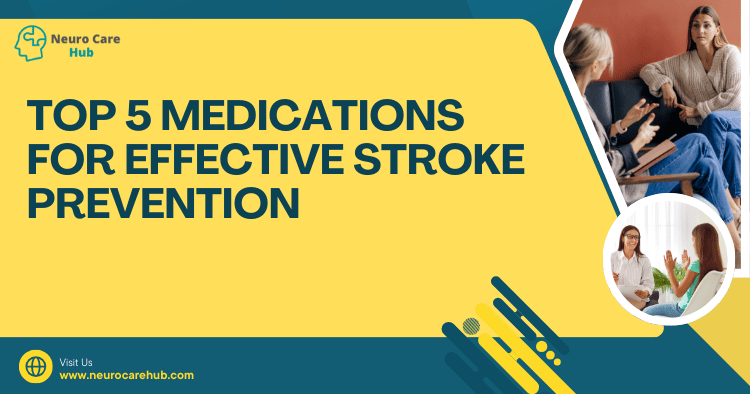Table of Contents
- Introduction
- 1. Antiplatelet Agents
- 2. Anticoagulants
- 3. Statins
- 4. Blood Pressure Medications
- 5. Diabetes Medications
- Conclusion
- FAQs
Introduction
Stroke remains a leading cause of death and disability worldwide, with new insights and advancements in prevention emerging every year. As we navigate through 2024 and beyond, understanding the medications available for stroke prevention is critical for individuals at risk. This article explores the top five medications used in stroke prevention, detailing their mechanisms, benefits, and potential side effects. Empowering yourself with this knowledge can enhance your approach to health management.
“Knowledge is power, especially when it comes to managing your health. Understanding the role of medication in stroke prevention can make a significant difference.”
1. Antiplatelet Agents
Antiplatelet agents are crucial in preventing strokes, particularly for individuals who have experienced a transient ischemic attack (TIA) or a previous stroke.
Commonly Used Antiplatelet Medications:
| Medication | Dosage | Common Side Effects |
|---|---|---|
| Aspirin | 81-325 mg daily | Gastrointestinal bleeding, nausea |
| Clopidogrel | 75 mg daily | Diarrhea, rash |
| Dipyridamole | 200 mg twice daily | Headache, dizziness |
How They Work: These medications prevent blood platelets from clumping together, thus reducing the likelihood of clot formation leading to a stroke.
Benefits: Research from the American Heart Association indicates that antiplatelet agents can reduce the risk of recurrent strokes by up to 25%.
“Aspirin is often the first line of defense in stroke prevention. It’s widely recognized and prescribed, but always discuss its use with your doctor.”
Potential Side Effects: While generally safe, these medications can increase bleeding risk. Discuss any concerns with your healthcare provider.
2. Anticoagulants
Anticoagulants, often referred to as “blood thinners,” are primarily used in patients with atrial fibrillation (AFib) or those who have mechanical heart valves.
Commonly Used Anticoagulants:
| Medication | Dosage | Common Side Effects |
|---|---|---|
| Warfarin | Varies, monitored | Bleeding, interactions with food |
| Rivaroxaban | 20 mg daily | Bleeding, liver enzyme changes |
| Apixaban | 5 mg twice daily | Bleeding, allergic reactions |
How They Work: Anticoagulants inhibit specific factors in the blood clotting process, significantly reducing the risk of clots that can lead to a stroke.
Benefits: Studies suggest that anticoagulants can lower stroke risk in AFib patients by around 68% compared to those not on these medications.
“The effectiveness of anticoagulants in stroke prevention is a game-changer for patients with AFib, but their use requires careful management.”
Potential Side Effects: Increased bleeding is a major concern, necessitating regular monitoring (especially for Warfarin) to ensure safe levels.
3. Statins
Statins are primarily known for lowering cholesterol but also play a role in stroke prevention.
Commonly Used Statins:
| Medication | Dosage | Common Side Effects |
|---|---|---|
| Atorvastatin | 10-80 mg daily | Muscle pain, liver enzyme changes |
| Simvastatin | 5-40 mg daily | Muscle pain, digestive issues |
| Rosuvastatin | 5-40 mg daily | Headache, nausea |
How They Work: Statins reduce blood cholesterol levels, which can decrease the formation of arterial plaques, thus lowering stroke risk.
Benefits: Research indicates that statins can reduce the risk of stroke by approximately 20% in high-risk populations.
“Statins are a cornerstone in managing cholesterol levels, but their benefits extend far beyond just heart health.”
Potential Side Effects: While generally well-tolerated, statins can cause muscle pain and liver issues in some individuals. Regular check-ups can help monitor these effects.
4. Blood Pressure Medications
Managing high blood pressure is one of the most effective strategies for preventing strokes.
Commonly Used Blood Pressure Medications:
| Medication | Dosage | Common Side Effects |
|---|---|---|
| Lisinopril | 10-40 mg daily | Cough, elevated potassium levels |
| Amlodipine | 2.5-10 mg daily | Swelling, dizziness |
| Losartan | 25-100 mg daily | Dizziness, fatigue |
How They Work: These medications help relax blood vessels, making it easier for the heart to pump blood, thereby lowering blood pressure.
Benefits: Lowering high blood pressure can reduce stroke risk by up to 38%, according to the American College of Cardiology.
“Consistent management of blood pressure is crucial. It’s not just about taking medication; it’s about adopting a holistic approach to health.”
Potential Side Effects: While generally safe, side effects can include dizziness or fatigue. Monitoring is essential for optimal blood pressure control.
5. Diabetes Medications
For individuals with diabetes, managing blood sugar levels is vital for overall health and stroke prevention.
Commonly Used Diabetes Medications:
| Medication | Dosage | Common Side Effects |
|---|---|---|
| Metformin | 500-2000 mg daily | Gastrointestinal upset, lactic acidosis (rare) |
| Glimepiride | 1-8 mg daily | Low blood sugar, weight gain |
| Liraglutide | 0.6-1.8 mg daily (injection) | Nausea, pancreatitis (rare) |
How They Work: These medications help control blood sugar levels, which is crucial since elevated blood sugar can increase the risk of cardiovascular diseases, including stroke.
Benefits: Effective diabetes management can reduce stroke risk by approximately 30-50%.
“Managing diabetes is a pivotal part of stroke prevention. It’s not just about medication — lifestyle changes also play a vital role.”
Potential Side Effects: While effective, these medications can lead to low blood sugar levels, making regular glucose monitoring essential.
Conclusion
Preventing strokes is a multifaceted approach that combines lifestyle changes with medication. Understanding these medications—antiplatelet agents, anticoagulants, statins, blood pressure medications, and diabetes medications—can empower you to engage actively in managing your health. Always consult your healthcare provider before starting any medication, as they can help tailor a prevention strategy suited to your unique needs.
“Your health is your most valuable asset. Take control of it by being informed and proactive.”
FAQs
1. Are all stroke prevention medications safe for everyone?
No, each medication has specific indications and contraindications. It’s essential to consult with your healthcare provider to determine which medication is appropriate for you.
2. Can lifestyle changes reduce the need for medications?
Yes, maintaining a healthy diet, exercising regularly, and avoiding smoking can significantly reduce your stroke risk and may decrease the need for medications.
3. How often should I have my blood pressure and cholesterol checked?
It’s generally recommended to have your blood pressure and cholesterol levels checked at least once a year. However, if you have existing health conditions, your doctor may suggest more frequent monitoring.
For more information, visit:
By staying informed about stroke prevention strategies and medications, you can take proactive steps toward better health. Stay safe, and don’t hesitate to seek medical advice tailored to your situation!
Also Look For:
- For insights on the essential steps for stroke rehabilitation, check out Top 5 Essential Steps for Stroke Rehabilitation Success.
- Learn about lifestyle changes to prevent stroke effectively at Top 5 Lifestyle Changes to Prevent Stroke Effectively.





